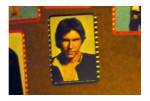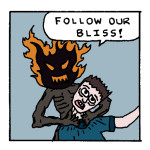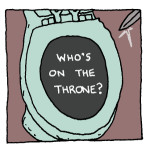Sat 26 Mar 2016
The Force Awakens: Star Bores Forever
Posted by laup under 2 Stars of the Magi, Interesting, Relevance, Review, Transmutation
Comments Off on The Force Awakens: Star Bores Forever
 When I was a kid and deep into my new love of Star Wars, I drew people with tee shirts that said “star bores” on them. It was a mock from someone who relived the scenes from the movie every day for months.
When I was a kid and deep into my new love of Star Wars, I drew people with tee shirts that said “star bores” on them. It was a mock from someone who relived the scenes from the movie every day for months.
Looking back now, I see that even as a kid I saw how merchandised creativity inflates towards drought. 1987’s Spaceballs would call this out ten years later.
Now, here we are almost forty years after the first movie and big business wants us to remain mired in the past by extending and expanding our projections into a revenue stream that will go on for decades more. People are happy to relive their past or spend their timeless youth in bonding to an expression that has become too large for its original purpose.
I watched the new movie and I thought it was a colossal bore that made little, if any sense. I can sort of remember some of the scenes and the lines, but I have yet to repeat any of it in my daily life. I laughed when the big character death came. Who cares? The movie doesn’t stand for anything.
What did strike me was how much this movie is dominated by a specific trait of dysfunctional storytelling known as incoherence. That means a failure to permit any premise or any element of exploration to be consistently enjoyed. Scenes are internally nonsensical and lacking in meaningful consequence.
Or to put it another way, you have lazy scriptwriting that leads to incompatible combinations of storytelling. The result is lifelessness in the art itself.
You get the confusing logic of a chase scene that fails to add up. The inability to parse what’s happening politically let alone mythologically. Characters are constantly interrupted by random plot without any reference points for the audience. It generates a stagnation that drifts and repeats, preventing any fun from spontaneously arising out of the situations of the movie.
The new characters never come into their own. They are quickly possessed by the franchise expectations and whatever energy they might bring to the table is swallowed up by the need to tell the same story over and over again.
The old characters are horrible set pieces going through the motions without any sense of destiny, history, passion or fun. They’re cast in the wrong roles and misused. Watching them pander and shamble through their appointed rounds made me nauseous.
If the story is always going to be the same soap opera based around the same group of lucky force winners then The Force Awakens sucks. Star wars sucks. This stuff is square, conformist, mass produced mummification of creativity now.
Poor direction and writing, average production, and good marketing. Not the stuff dreams are made of.
2 out of 5 Stars of the Magi


